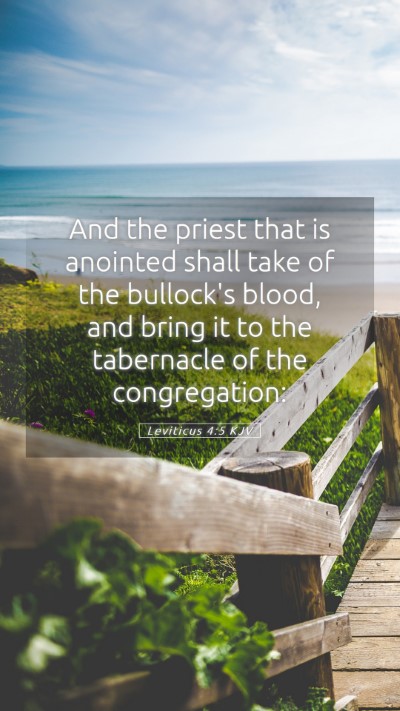Understanding Leviticus 4:5
Leviticus 4:5 is a pivotal verse within the framework of Old Testament law, specifically concerning the rituals of sin offerings. This verse states:
“And the priest that is anointed shall take of the bullock’s blood, and bring it to the tabernacle of the congregation.”
In this verse, we witness the specific instructions given regarding the responsibilities of the anointed priest in the sacrificial process. The blood of the bullock symbolizes atonement, conveying deep theological meaning regarding sin and the need for purification.
Significance of Blood in Sacrificial System
The sacrificial system in the Old Testament, notably highlighted in this verse, serves as a precursor to the ultimate sacrifice of Christ. The significance of blood for atonement is explored in several public domain commentaries:
- Matthew Henry: He emphasizes the essential role of the priest as an intermediary between God and the people. The anointed priest's actions, particularly the handling of the blood, foreshadows the atonement work of Christ (Hebrews 9:22).
- Albert Barnes: Barnes elaborates on the necessity of the blood sacrifice in the covenant relationship between God and Israel. He notes how the blood signifies life and how it reconciles the worshippers with God.
- Adam Clarke: Clarke points out the importance of the priest's role and the consecrated nature of the anointed priesthood, reflecting on the deep implications of sin and the serious consequences that necessitate such sacrifices.
Bible Verse Explanation
Leviticus 4:5 is integral for understanding the broader themes of sin, atonement, and intercession. The act of taking the blood to the tabernacle is a representation of sin being addressed in a holy space, bringing forth the notion of divine justice being satisfied through sacrifice.
Key Themes of Leviticus 4:5:
- Intercession: The priest acts as a mediator, embodying the need for intercessors in our spiritual life. This draws parallels with the New Testament where Christ serves as our High Priest (Hebrews 4:14).
- Atonement: The bullock's blood becomes an essential element for the cleansing of sin, emphasizing the serious nature of transgressions against divine law (Romans 6:23).
- Holiness of God: The reference to the tabernacle signifies the sacredness of God’s presence and highlights the requirement for purity and reverence in approaching Him (Isaiah 59:2).
Application of Leviticus 4:5 in Daily Life
While the cultural context of this verse differs significantly from contemporary practices, its principles can still be applied today:
- Recognizing Sin: Acknowledging personal sin is vital. Just as the Israelites brought their offerings, believers today are called to confess and seek forgiveness (1 John 1:9).
- Understanding Sacrifice: The sacrificial system leads to a deeper appreciation of Christ's atonement, prompting believers to reflect on His ultimate sacrifice (John 3:16).
- Seeking God’s Presence: Just as the blood was brought to the tabernacle, believers are encouraged to approach God with reverence and humility (James 4:8).
Cross References
Leviticus 4:5 is interwoven with several other Scriptures that deepen the understanding of this verse:
- Hebrews 9:22: "And almost all things are by the law purged with blood; and without shedding of blood is no remission."
- 1 John 1:7: "But if we walk in the light, as he is in the light, we have fellowship one with another, and the blood of Jesus Christ his Son cleanseth us from all sin."
- Romans 3:25: "Whom God hath set forth to be a propitiation through faith in his blood, to declare his righteousness for the remission of sins that are past, through the forbearance of God."
Conclusion
In summary, Leviticus 4:5 encapsulates profound truths about sin, atonement, and the necessity of a mediator. By examining this verse through the lens of public domain commentaries, believers can gain valuable Bible verse meanings and Bible verse interpretations that enhance their Bible study insights. The exploration of such texts encourages a deeper understanding of Scripture and fosters a longing to apply the sacred truths of the Bible in everyday life.


